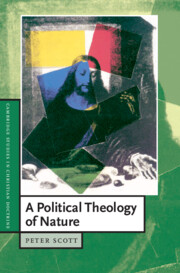Book contents
- Frontmatter
- Contents
- Preface
- Part I God, nature and modernity
- Part II The politics of nature
- 3 Deep ecology: the return of nature
- 4 Ecofeminism: the reproduction of nature
- 5 Social ecology: the dialectical emergence of nature and society
- 6 Socialist ecology: the production of nature
- Part III The triune God and un/natural humanity
- Bibliography
- Index
4 - Ecofeminism: the reproduction of nature
Published online by Cambridge University Press: 09 November 2009
- Frontmatter
- Contents
- Preface
- Part I God, nature and modernity
- Part II The politics of nature
- 3 Deep ecology: the return of nature
- 4 Ecofeminism: the reproduction of nature
- 5 Social ecology: the dialectical emergence of nature and society
- 6 Socialist ecology: the production of nature
- Part III The triune God and un/natural humanity
- Bibliography
- Index
Summary
Women–nature?
Ecofeminist theory makes a highly important contribution to this study. The common realm is not a patriarchal construct nor is it sex/gender blind. The healing of the relations between ‘humanity’ and nature does not turn upon the fracturing of women's lives nor does the production of nature exclude its reproduction. I have already noted that the requirement to rethink the relations between nature, humanity and God has been proposed in ecofeminist religious thinking. Further, ecofeminist commitments have already been presented: in chapter 2, the model of production was expanded to include vital issues concerning the reproduction of the human. In this chapter certain aspects of ecofeminist philosophy will be considered. Ecofeminism merits treatment at this point in the argument because the theoretical development of ecofeminism has been secured partly by way of the critique of deep ecology.
Important though these considerations are, the crucial contribution that this political theology of nature learns from ecofeminism is the theme of the ‘agency of nature’. As Donna Haraway notes: ‘Ecofeminists have perhaps been most insistent on some version of the world as active subject.’
Of course, such a view of the agency of nature is deeply consonant with the common realm of nature, humanity and God: the tendencies and movements of nature in a mutual yet asymmetrical dynamic indicate activities with which un/natural humanity interacts. Humanity indwells nature; nature indwells humanity.
- Type
- Chapter
- Information
- A Political Theology of Nature , pp. 89 - 108Publisher: Cambridge University PressPrint publication year: 2003

